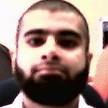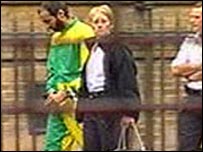Chechnya
The Messenger of Allah (Allah grant him blessings and peace) said, "A time will come upon the people in which a person among them practicing his Religion with perseverance will be like one clutching onto a cinder." In the face of the persecution our Ummah faces today, we must challenge these laws that attack our faith and remain defiant in our support for our suffering brothers and sisters around the world. Refuse to kneel - remember that our foreheads bow to Allah (swt)alone.

Some of our fans have been upset with the flying of certain flags denoting particular regions of the world
Arsenal as a club prides itself on being inclusive with respect to all nationalities, cultural and ethnic groups.
We have therefore decided that in order for all of our fans to enjoy their experience at Emirates Stadium, we are asking that only flags in support of Arsenal Football Club, without any national emblems, are displayed within the stadium.
We will be implementing this policy with immediate effect. Thank you for your assistance in this matter.
Okaaaaay. We have a problem with the Israeli flag which will be flown so proudly for 2 years for a measly £200k at the Emirates.Edelman & Dein should be sacked just for selling Arsenal for so cheap, let alone associating one of the worlds best footballing sides with a racist apartheid state.
Doesn't make sense as Henry is the face of kick racism out of football!
heres an IHRC action alert. Pls keep up the pressure.

Olmert filmed 'Coaching' Prodi
Channel 10 television suggested that Prodi's statement on the continued Jewish identity of
"You said something about a Jewish state [in the past]. I know that," Olmert is shown telling Prodi.
Olmert and Prodi aides had no immediate comment on the Channel 10 footage.
Source: Aljazeera

They said the FBI's week-old bulletin had been sent to state and local law enforcement officials out of an abundance of caution and that there was no specific intelligence about any impending attack.
The officials said the medical condition of the 68-year-old Rahman had subsequently improved, that he had been released from the hospital, that he now is in stable condition and back in a federal prison medical facility.
According to the bulletin, Rahman began to spit up blood on December 6 and was taken from the prison to the emergency room at a hospital in Springfield, Missouri, where doctors discovered a tumor on his liver, the officials said.
The Egyptian sheikh, who was convicted in 1995 and sentenced to life in prison, is currently at a medical center for federal prisoners in Springfield. He has long suffered from a number of medical problems, including diabetes and heart ailments.
The bulletin noted that in the past Rahman has called upon his supporters to commit acts of violence against the United States if he died in a U.S. prison, the officials said.
In New York, Paul Browne, the police deputy commissioner for public information, said, "The FBI shared its assessment with the New York City Police Department. New York City remains on the same heightened alert status, as it has since 9/11."
Reuters

TONY JONES: How does an Israeli jet using laser-guided bombs manage to wipe out a UN post whose coordinates were very well-known to the Israeli military?
MARK REGEV: I think that's an excellent question and I wish I had a good answer for you today but, I'll be honest, I don't. The Prime Minister has ordered the military to conduct a comprehensive investigation.
....
TONY JONES: We understand it was a bombing from the air. Do you understand - do you know whether in fact it was a laser-guided bomb?
MARK REGEV: No, I don't have that information and I apologise but, once again, there will be nothing to hide here.
....
TONY JONES: Here are some facts we can talk about. The actual UN post is known as Control Base Khiam. It was painted white, had a big UN sign on the roof and other UN signs around it. It had been there in fact for decades. How could it have been conceivably accidentally targeted?
MARK REGEV: Well, once again it is not for me to say.
....
TONY JONES: OK. How can you explain the attack on Sunday night reportedly by an Apache helicopter on that ambulance heading for Tyre in a convoy where an Israeli missile went straight through the centre of the Red Cross on the roof of the ambulance?
MARK REGEV: I'm sorry, but I haven't been briefed on that particular event and so I don't have a good answer for you.
TONY JONES: It's on front page of the newspapers here in Australia and it's received coverage all round the world because I've read it on the Internet.
MARK REGEV: I'm just not familiar with that event and I apologise and I can say the following: we do not deliberately target civilian targets, whether they are Lebanese civilians or anyone's civilians.
Source
 The alleged plot prompted a massive security clampdown |
He has moved the case of Rashid Rauf, a Briton, from an anti-terrorism court to a regular court, where he faces lesser charges such as forgery.
Pakistan has presented Mr Rauf as one of the ringleaders behind the alleged plan to blow up flights out of London.
The British authorities say they foiled it with Pakistan's help in August.
'Explosives'
The arrest of Rashid Rauf in Pakistan triggered arrests in the UK of a number of suspects allegedly plotting to blow up transatlantic flights.
The Pakistani authorities described him as a key figure.
But an anti-terrorism court in Rawalpindi found no evidence that he had been involved in terrorist activities or that he belonged to a terrorist organisation.
As well as forgery charges, Mr Rauf has also been charged with carrying explosives.
But his lawyer says police evidence amounts only to bottles of hydrogen peroxide found in his possession.
Hydrogen peroxide is a disinfectant that can be used for bomb-making if other chemicals are added.
'Suspected conspiracy'
In August, the British government requested the extradition of Mr Rauf, a Briton of Pakistani origin, in connection with a murder committed in 2002.
Scotland Yard declined to discuss which murder case the request related to.
The government in Pakistan, which has no extradition treaty with the UK, said it was considering the request.
Rashid Rauf was arrested in Pakistan earlier that month over the alleged plot to blow up US-bound aircraft, Pakistan's foreign ministry said.
He has been described by Pakistan's government as a "key person" in the "suspected conspiracy"
Interesting...very interesting. Also notice how, just as was the case with Mhd Abdul Kahar (Forest gate) and the late Mr Menezes (Stockwell), they follow up their blunders with slanderoous and/or fallacious statements. They want to question Mr Rauf in connection with a murder in 2002....yeah right.
Elsewhere the oppressive police in the UK were given a bloody nose by the House of Lords for violating the right of freedom of expression and lawful assembly
Source: BBC (again)
http://www.timesonline.co.uk/article/0,,2087-2496507,00.html
More useless government initiatives to deradicalize Muslims
 Claims of casualties in have been almost impossible to verify |
A statement released on Sunday said the true figure was seven or eight.
It is understood that figures for the total number of fighters and the number of casualties were confused, but the mistake was not immediately corrected.
The clash near Musa Qala in Helmand province involved Danish forces who were fighting alongside British troops.
Despite the battle, Nato's International Security Assistance Force claims a peace deal with local elders, which saw British troops pull out of Musa Qala, is still holding.
The BBC's Alastair Leithead in Kabul says this year has seen a huge upsurge in violence and there have been many claims of casualties by the Taleban and the international forces - but they have been almost impossible to verify.
Thousands of people are thought to have been killed by both sides, many of them civilians in suicide bombings, and others in air strikes and heavy fighting, our correspondent says.
 Desmond Tutu won the Nobel Peace Prize in 1984 |
Mr Tutu's team would have investigated last month's killings of 19 civilians in an Israeli artillery barrage in the northern town of Beit Hanoun.
But Israel had not granted the former Archbishop of Cape Town the necessary travel clearance, a UN official said.
The Israeli government said it had not formally denied visas to the UN team.
Mr Tutu's team was supposed to report its findings to the Geneva-based UN Human Rights Council by Friday.
Spokeswoman Sonia Bakar said Mr Tutu had other engagements and could not wait any longer for Israeli permission to travel.
"It has been cancelled. We were supposed to go yesterday (Sunday)," she said.
An Israeli government spokesman said it had not made a final decision on whether to grant visas for Mr Tutu's team.
He said the government did "not have a problem not with the personalities, we had a problem with the institution. We saw a situation whereby the human rights mechanism of the UN was being cynically exploited to advance an anti-Israel agenda".
Shelling 'an accident'
The 47-nation Human Rights Council authorised the mission last month after condemning the killings.
It asked Mr Tutu to assess the situation of victims, address the needs of survivors and make recommendations on ways to protect Palestinian civilians against further Israeli attacks.
The shelling, which Israel said was unintended, came after its troops wound up a week-long incursion designed to curb Palestinian rocket attacks on Israel from the town.
The Israeli army claimed Beit Hanoun was a rocket-launching stronghold.
Mr Tutu - the winner of the 1984 Nobel Peace Prize for his fight against apartheid in South Africa - chaired the country's Truth and Reconciliation Commission after the end of white minority rule.
Today they’ve decided to extradite me

 In the centre of Beit Hanoun, there is nothing left of the 800-year-old mosque but the minaret. It looks like a lighthouse stranded in a sea of rubble. People whose homes were demolished during the latest Israeli army incursion sit on plastic chairs around bonfires. At night they bunk down with the neighbours. One of them is Watfa Kafarna.
In the centre of Beit Hanoun, there is nothing left of the 800-year-old mosque but the minaret. It looks like a lighthouse stranded in a sea of rubble. People whose homes were demolished during the latest Israeli army incursion sit on plastic chairs around bonfires. At night they bunk down with the neighbours. One of them is Watfa Kafarna.

 Lots of discussion STILL going on about the niqaab. Its amazing - for years we are hearing we can't tell a woman what to wear and now it seems the entire world is telling Muslim women to strip off.
Lots of discussion STILL going on about the niqaab. Its amazing - for years we are hearing we can't tell a woman what to wear and now it seems the entire world is telling Muslim women to strip off.
